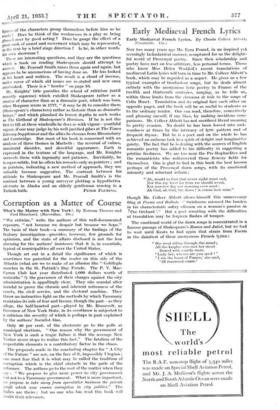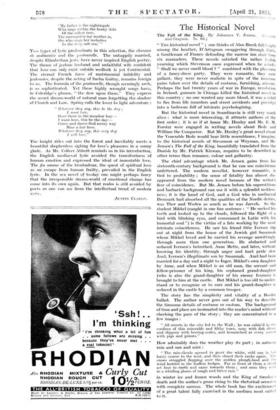Early Mediaeval French Lyrics
Early Mediaeval French Lyrics. By Claude Colleer Abbotti (Constable. 15s.)
Nov too many years ago Mr. Ezra Pound, in an inspired yet seemingly lackadaisical manner, recaptured for us the delight- ful world of Provencal poetry. Since then scholarship and poetry have met on less arbitrary, less personal terms. Those who know Miss Helen Waddell's recent translations of mediaeval Latin lyrics will turn in time to Mr. Colleer Abbott's book, which may be regarded as a sequel. He gives us a few typical examples of troubadour songs, but he deals almost entirely with the anonymous lyric poetry in France of the twelfth and thirteenth centuries, ranging, as he tells us, within those limits from the chansons de toile to the songs of Colin Muset. Translation and its original face each other on opposite pages, and the book will be as useful to students as to the ordinary. reader. One can read, therefore, correctively and pleasing oneself, if one likes, by making invidious com- parisons. Mr. Colleer Abbott has not sacrificed literal meaning to pretty evasion. No doubt he has been forced into awk- wardness at times by the intricacy of lyric pattern and of frequent rhyme. But he is a poet and on the whole he has achieved an arduous task in a spirit of delight and imaginative gaiety. The fact that he is dealing with the sources of English romantic poetry has added to his difficulty in suggesting a pristine freshness. We arc too near the Pre-Raphaelites and the romanticists who rediscovered those flowery fields for themselves. One is glad to find in this book the best known perhaps of the Provencal dawn songs, with its emotional intensity and reluctant refrain : " Ah, would to God that never night must end, Nor this my lover far from mo should wend, Nor watcher day nor dawning over send 1 Ah God, ah God, the dawn it comes how soon."
though Mr. Colleer Abbott allows himself •this unnecessary fling at Poems and Ballads-- Swinburne misused the burden in his characteristic sultry effusion on a woman's passion in fl'he Orchard '." But a poet wrestling with the difficulties of translation may be forgiven flashes of temper.
The emotional world of the dawn songs is concentrated in a famous passage of Shakespeare's Romeo and Juliet, but we had to wait until Keats to find again that strain from Faerie itt the daintiest of these anonymous French lyrics :
" She went riding through the mead ; All the knights who met her steed Bowed with courtly state. ' Lady fair, whence are you sped ? ' ' I am the boast of France,' she said, ' Of renowned estate.'
My father is the nightingale Who sings within the bosky dale Of the tallest tree.
The mermaiden my mother is, She who sings her melodies In the deep salt sea.' "
Two types of lyric predominate in this selection, the chanson de malmariee and the pastourelle. The unhappily married, despite Elizabethan jests, have never inspired English poetry. The theme of jealous husband and unfaithful wife confident that love can only exist outside wedlock is yet Continental. The eternal French farce of matrimonial infidelity and jealousies, despite the acting of Sacha Guitry, remains foreign to us. The formula of the pastourelle, though seemingly arch, is as sophisticated. Yet these highly wrought songs have, in Coleridge's phrase, " the dew upon them." They express the secret dream-world of natural man forgetting the shadow of Church and Law. Spring calls the lover to light adventure :
" Whatever they say, this be the day ; I must love.
Over there in the meadow hay— I want love, this be the day— Game and dance find merry way
Mine a fair love.
Whatever they say, this very day I will love."
The knight rides out into the forest and inevitably meets a beautiful shepherdess sighing for love's pleasures in a sunny glade. As Mr. Colleer Abbott reminds us in his introduction, the English mediaeval lyric avoided the transitoriness of human emotion and expressed the ideal of immutable love. The fin amour of the troubadour, the quest of spiritual love as an escape from human frailty, prevailed in the English lyric. In the sex novel of to-day one might perhaps fancy that the irresponsible dream-world of emotional change has come into its own again. But that realm is still avoided by poets as one can see from the intellectual trend of modern verse.
AUSTIN CLARET.







































 Previous page
Previous page